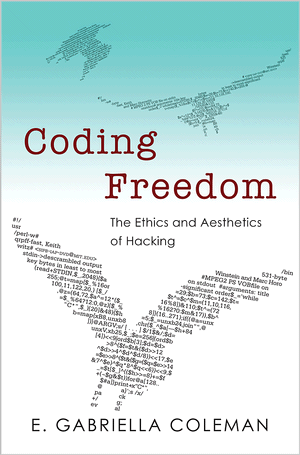E. Gabriella Coleman: Coding Freedom: The Ethics and Aesthetics of Hacking (2012–) [EN, SC]
Filed under book | Tags: · aesthetics, anonymous, anthropology, code, computing, ethics, floss, free software, hacker culture, hacking, intellectual property, internet, internet activism, software, web

“Who are computer hackers? What is free software? And what does the emergence of a community dedicated to the production of free and open source software–and to hacking as a technical, aesthetic, and moral project–reveal about the values of contemporary liberalism? Exploring the rise and political significance of the free and open source software (F/OSS) movement in the United States and Europe, Coding Freedom details the ethics behind hackers’ devotion to F/OSS, the social codes that guide its production, and the political struggles through which hackers question the scope and direction of copyright and patent law. In telling the story of the F/OSS movement, the book unfolds a broader narrative involving computing, the politics of access, and intellectual property.
E. Gabriella Coleman tracks the ways in which hackers collaborate and examines passionate manifestos, hacker humor, free software project governance, and festive hacker conferences. Looking at the ways that hackers sustain their productive freedom, Coleman shows that these activists, driven by a commitment to their work, reformulate key ideals including free speech, transparency, and meritocracy, and refuse restrictive intellectual protections. Coleman demonstrates how hacking, so often marginalized or misunderstood, sheds light on the continuing relevance of liberalism in online collaboration.”
Publisher Princeton University Press, 2012
Creative Commons Attribution-NonCommercial-NoDerivs 3.0 License
ISBN 1400845297, 9781400845293
264 pages
Responses: Jo Bates, Denisa Kera, Brett Lunceford, Jorge Luis Zapico, Alexander Halavais, Stéphane Leman-Langlois, Ethan Zuckerman
Reviews: James Grimmelmann (Jotwell: Cyberlaw, 2012), David Banks (Cyborgology, 2012), Eric Raymond (2013), Cade Metz (Wired, 2013), Mike Doherty (Hashbang, 2013), Bruce Byfield (Linux Mag blog, 2013), Bryan Behrenshausen (OpenSource.com, 2013), Roy S. Gutterman (Journalism & Mass Communication Q, 2014), Tim Jordan (American J Sociology, 2014), Emily T. A. Earl (Techno_ethno, 2014), Anne Elizabeth Yaniga (Techno_ethno, 2014), Sebastian Kubitschko (Culture Machine, 2014).
Coding Freedom (English, updated on 2013-1-18, PDF, EPUB [updated on 2014-9-2])
Kodiranje slobode. Etika i estetika hakovanja (Serbo-Croatian, trans. Ljubica Gotić and Predrag Todić, 2014)
Philip E. Agre: Computation and Human Experience (1997)
Filed under book | Tags: · artificial intelligence, computing, technology

“This book offers a critical reconstruction of the fundamental ideas and methods of artificial intelligence research. Through close attention to the metaphors of artificial intelligence and their consequences for the field’s patterns of success and failure, it argues for a reorientation of the field away from thought in the head and towards activity in the world. By considering computational ideas in a large, philosophical framework, the author eases critical dialogue between technology and the social sciences. AI can benefit from an understanding of the field in relation to human nature, and in return, it offers a powerful mode of investigation into the practicalities of physical realization.”
Publisher Cambridge University Press, 1997
ISBN 0521386039, 9780521386036
Learning in Doing: Social, Cognitive and Computational Perspectives series
392 pages
Paul N. Edwards: A Vast Machine: Computer Models, Climate Data, and the Politics of Global Warming (2010)
Filed under book | Tags: · climate, climate crisis, computing, data, global warming, meteorology, politics, science, weather

“Global warming skeptics often fall back on the argument that the scientific case for global warming is all model predictions, nothing but simulation; they warn us that we need to wait for real data, “sound science.” In A Vast Machine Paul Edwards has news for these doubters: without models, there are no data. Today, no collection of signals or observations–even from satellites, which can “see” the whole planet with a single instrument–becomes global in time and space without passing through a series of data models. Everything we know about the world’s climate we know through models. Edwards offers an engaging and innovative history of how scientists learned to understand the atmosphere–to measure it, trace its past, and model its future.
Edwards argues that all our knowledge about climate change comes from three kinds of computer models: simulation models of weather and climate; reanalysis models, which recreate climate history from historical weather data; and data models, used to combine and adjust measurements from many different sources. Meteorology creates knowledge through an infrastructure (weather stations and other data platforms) that covers the whole world, making global data. This infrastructure generates information so vast in quantity and so diverse in quality and form that it can be understood only by computer analysis–making data global. Edwards describes the science behind the scientific consensus on climate change, arguing that over the years data and models have converged to create a stable, reliable, and trustworthy basis for the reality of global warming.”
Publisher MIT Press, 2010
Infrastructures Series
ISBN 0262013924, 9780262013925
xxvii+518 pages
Reviews: Noel Castree (American Scientist, 2010), Ronald E. Doel (American Historical Review, 2011), Myles Allen (Nature, 2010), Richard C.J. Somerville (Science, 2011), Gabriele Gramelsberger (Minerva, 2012), McKenzie Wark (White Review, 2014).
PDF, PDF (updated on 2018-11-4)
Companion website (added on 2018-11-4)

